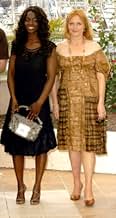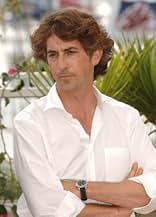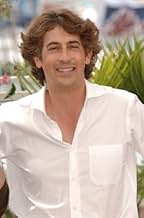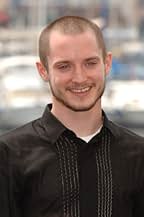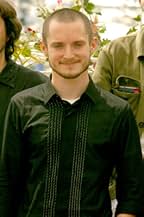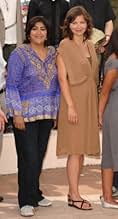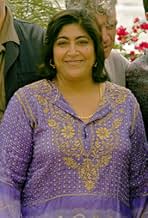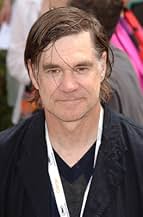CALIFICACIÓN DE IMDb
7.2/10
76 k
TU CALIFICACIÓN
En los vecindarios de París, el amor se esconde, se revela, se imita, se agota, se reinventa y se despierta.En los vecindarios de París, el amor se esconde, se revela, se imita, se agota, se reinventa y se despierta.En los vecindarios de París, el amor se esconde, se revela, se imita, se agota, se reinventa y se despierta.
- Premios
- 3 premios ganados y 2 nominaciones en total
Melchior Derouet
- Thomas (segment "Faubourg Saint-Denis")
- (as Melchior Beslon)
Opiniones destacadas
I was lucky enough to attend a screening in Stockholm for this elegantly expressed, enjoyable, and thought-provoking film. With romance as the heaviest weapon in its arsenal, Paris je t'aime boldly plunges into love in Paris, navigating the different forms in eighteen separate "quartiers" but without pouting Parisiennes and saccharine formulas. Its goldmine undoubtedly stems from frustration on the directors' parts frustration over only having 5-10 minutes of screen time thereby you are only presented with the best and most assured direction from each party.
Debating whether or not I should review all 18 segments, I reached the conclusion that it would be merely redundant and long-winded. Instead simply rest assured that each director graces the film with their eccentric styles and skills, and certainly you'll find your favourite. Although Gus Van Sant cannot resist the temptation to be introspective, his LES MARAIS is one of the better contributions, even sneaking in a well-placed Kurt Cobain reference. The Coen brothers recreate one of the more accessible segments in Paris, a scene with a muted but emotionally transparent Steve Buscemi, deadpan humour and clever camera angles that surely generated the most laughter in my theatre, and perhaps rightly so.
In this way, all story lines are exquisitely unique filtered through the minds of different directors but the one that deviates the most from the rest is Vincenzo Natali's QUARTIER DE LA MADELEINE, a dark horror-Gothic love starring Elijah Wood as a lost tourist in the backstreets of Paris in the night who meets a vampiress. With a black-and-white format but blood-red colour contrast that seems to incongruously bleed off screen, it nearly becomes a pastiche of Sin City a refreshing eerie and visual turn in an otherwise fairly grounded film.
Yet my single favourite segment was FAUBOURG SAINT-DENIS by Tom Tykwer but I think I was conditioned to think so, given that I went in the theatre with him as my favourite and nudged my friend in the side saying "finally, that's my favourite director here". Nevertheless, it cannot be denied that Tykwer delivers a lovely segment in which a blind boy picks up the phone, and hears from his girlfriend (Portman - for once not annoying) that she breaks up with him, and he reflects on their relationship. As is Tywker's style, the story is dizzyingly fast-paced, kinetic and repetitive, featuring screaming and running (Lola Rennt) making it the most adrenaline-pumping segment in Paris je t'aime and possibly also the most touching once Tywker starts wielding his most powerful tool music.
To fill the negative account, clearly not all directors manage as touching as Tywker, Van Sant, Cohens, Coixet and Dépardieu. Sylvain Chomet scrapes the bottom of the pile by carving out a truly disposable segment in which a little boy retells the story of how his parents met. They are two lonely mimes. This part is so in-your-face French and desperately quirky that it is insulting to international viewers. Suwa also directs a poor and fluffy segment with an unusually haggard-looking Juliette Binoche whom mourns the loss of her son. Nothing else happens. Finally, the wrap-up and interweaving of the 18 stories in the end feels somewhat rushed and half-hearted.
Yet Paris je t'aime truly spoils you with quality, for all the other stories are well-crafted with crisp acting and amusing writing. It is certainly one of the highlights of 2006 (not saying much, I suppose) and a very personal film in the sense that it is unavoidable to pick a favourite and a least favourite. Highly recommended both to mainstream of "pretentious" (heh) audiences.
8 out 10
Debating whether or not I should review all 18 segments, I reached the conclusion that it would be merely redundant and long-winded. Instead simply rest assured that each director graces the film with their eccentric styles and skills, and certainly you'll find your favourite. Although Gus Van Sant cannot resist the temptation to be introspective, his LES MARAIS is one of the better contributions, even sneaking in a well-placed Kurt Cobain reference. The Coen brothers recreate one of the more accessible segments in Paris, a scene with a muted but emotionally transparent Steve Buscemi, deadpan humour and clever camera angles that surely generated the most laughter in my theatre, and perhaps rightly so.
In this way, all story lines are exquisitely unique filtered through the minds of different directors but the one that deviates the most from the rest is Vincenzo Natali's QUARTIER DE LA MADELEINE, a dark horror-Gothic love starring Elijah Wood as a lost tourist in the backstreets of Paris in the night who meets a vampiress. With a black-and-white format but blood-red colour contrast that seems to incongruously bleed off screen, it nearly becomes a pastiche of Sin City a refreshing eerie and visual turn in an otherwise fairly grounded film.
Yet my single favourite segment was FAUBOURG SAINT-DENIS by Tom Tykwer but I think I was conditioned to think so, given that I went in the theatre with him as my favourite and nudged my friend in the side saying "finally, that's my favourite director here". Nevertheless, it cannot be denied that Tykwer delivers a lovely segment in which a blind boy picks up the phone, and hears from his girlfriend (Portman - for once not annoying) that she breaks up with him, and he reflects on their relationship. As is Tywker's style, the story is dizzyingly fast-paced, kinetic and repetitive, featuring screaming and running (Lola Rennt) making it the most adrenaline-pumping segment in Paris je t'aime and possibly also the most touching once Tywker starts wielding his most powerful tool music.
To fill the negative account, clearly not all directors manage as touching as Tywker, Van Sant, Cohens, Coixet and Dépardieu. Sylvain Chomet scrapes the bottom of the pile by carving out a truly disposable segment in which a little boy retells the story of how his parents met. They are two lonely mimes. This part is so in-your-face French and desperately quirky that it is insulting to international viewers. Suwa also directs a poor and fluffy segment with an unusually haggard-looking Juliette Binoche whom mourns the loss of her son. Nothing else happens. Finally, the wrap-up and interweaving of the 18 stories in the end feels somewhat rushed and half-hearted.
Yet Paris je t'aime truly spoils you with quality, for all the other stories are well-crafted with crisp acting and amusing writing. It is certainly one of the highlights of 2006 (not saying much, I suppose) and a very personal film in the sense that it is unavoidable to pick a favourite and a least favourite. Highly recommended both to mainstream of "pretentious" (heh) audiences.
8 out 10
Sadly, this is an awful grab bag of mostly trivial stories. Certainly it is ambitious and interesting as a concept, and Paris looks beautiful, but the producers didn't rein in the directors and what appears winning in theory becomes a lazy mishmash in execution. Each director was given five minutes of screen time and two days to shoot their film. Almost all of the directors figured they could dispense with writers and do it themselves. A bit of ego, a bit of film school, and a misunderstanding that even five minutes of screen time requires a writer's hand, especially so since the short time frame demands concise story telling skills.
Indeed, some of these film makers, e.g. Christopher Doyle, have barely sat in a director's chair, much less be worth trumpeting as members of an extraordinary group of visionaries. And the concept involves love stories and the love for Paris. What connection is there with this concept and the filmography of Joel and Ethan Coen? In fact the heavy American and British presence seems more mercenary than visionary from the producing end of things. Ben Gazzara and Gena Rowlands playing two Americans finalizing their divorce in a restaurant could have been filmed in New York or Chicago and shipped over to France for attachment to the movie. Worse, this episode relegates a giant of French cinema, Gerard Depardieu, to the minuscule part of the restaurant owner. There's nothing wrong with having some stories about tourists and expatriates, but this collection relies far too much on it. The bulk of the Parisians in this film are relegated to background chatter and bit parts. Surprisingly, even the city is relegated to background fodder. It appears that almost none of the film makers have any sense of Paris, or what to do with it given the opportunity to make a small film there. Many take place in nondescript indoor locations, or in the case of the Elijah Wood episode, a meaningless dark street straight out of 'Sin City.' Story wise, this is a director's film. Therefore the writing is weak and in some cases almost non-existent. In the case of Cuaron's episode with Nick Nolte, even the direction is non-existent (almost entirely a long shot track of Nolte yakking away to his nubile daughter as they walk down a street -- once again, a heavy American element with no trace of Paris except some dialogue). Some of the vignettes have "punchlines", while others merely fade away or end pointless and lost. The two most "commercial" feature Steve Buscemi in a cartoonish skit in a Metro station, and an absurd tryst between Elijah Wood and a vampiress. Both stand out but for the wrong reasons. Buscemi is forced to say nothing throughout his episode, and to behave like a punching bag for no reason. At least it IS snappily directed, and makes its point and ends with an exclamation. But it's also more clichéd American-in-Paris tourism. The Wood vampiress story not only doesn't belong in this film, it is also extremely predictable as a vampire sketch.
Many of the other stories seem either a small part of a bigger film, or a made-up hodgepodge to fill five minutes. To each his own as to the merits of the results. Certainly this smörgåsbord provides enough promise in its theme to delight those who think they're getting a taste of Paris along with humanistic stories (rather than the usual gangster, spy, or sleaze films using the city for its location). But I think the producers should have demanded that the directors adhere to the concept rather than allow them free rein to indulge in half-thought out skits that have only an arbitrary connection to the locations of the title city.
Indeed, some of these film makers, e.g. Christopher Doyle, have barely sat in a director's chair, much less be worth trumpeting as members of an extraordinary group of visionaries. And the concept involves love stories and the love for Paris. What connection is there with this concept and the filmography of Joel and Ethan Coen? In fact the heavy American and British presence seems more mercenary than visionary from the producing end of things. Ben Gazzara and Gena Rowlands playing two Americans finalizing their divorce in a restaurant could have been filmed in New York or Chicago and shipped over to France for attachment to the movie. Worse, this episode relegates a giant of French cinema, Gerard Depardieu, to the minuscule part of the restaurant owner. There's nothing wrong with having some stories about tourists and expatriates, but this collection relies far too much on it. The bulk of the Parisians in this film are relegated to background chatter and bit parts. Surprisingly, even the city is relegated to background fodder. It appears that almost none of the film makers have any sense of Paris, or what to do with it given the opportunity to make a small film there. Many take place in nondescript indoor locations, or in the case of the Elijah Wood episode, a meaningless dark street straight out of 'Sin City.' Story wise, this is a director's film. Therefore the writing is weak and in some cases almost non-existent. In the case of Cuaron's episode with Nick Nolte, even the direction is non-existent (almost entirely a long shot track of Nolte yakking away to his nubile daughter as they walk down a street -- once again, a heavy American element with no trace of Paris except some dialogue). Some of the vignettes have "punchlines", while others merely fade away or end pointless and lost. The two most "commercial" feature Steve Buscemi in a cartoonish skit in a Metro station, and an absurd tryst between Elijah Wood and a vampiress. Both stand out but for the wrong reasons. Buscemi is forced to say nothing throughout his episode, and to behave like a punching bag for no reason. At least it IS snappily directed, and makes its point and ends with an exclamation. But it's also more clichéd American-in-Paris tourism. The Wood vampiress story not only doesn't belong in this film, it is also extremely predictable as a vampire sketch.
Many of the other stories seem either a small part of a bigger film, or a made-up hodgepodge to fill five minutes. To each his own as to the merits of the results. Certainly this smörgåsbord provides enough promise in its theme to delight those who think they're getting a taste of Paris along with humanistic stories (rather than the usual gangster, spy, or sleaze films using the city for its location). But I think the producers should have demanded that the directors adhere to the concept rather than allow them free rein to indulge in half-thought out skits that have only an arbitrary connection to the locations of the title city.
Delightful film directed by some of the best directors in the industry today. The film is also casting some of the great actors of our time, not just from France but from everywhere.
My favorite segments:
14th arrondissement: Carol (Margo Martindale), from Denver, comes to Paris to learn French and also to make a sense of her life.
Montmartre: there was probably not a better way to start this movie than with this segment on romantic Paris.
Loin du 16ème: an image of Paris that we are better aware of since the riots in the Cités. Ana (Catalina Sandino Moreno) spends more time taking care of somebody else's kid (she's a nanny) than of her own.
Quartier Latin: so much fun to see Gérard Depardieu as the "tenancier de bar" with Gena Rowlands and Ben Gazzara discussing their divorce.
Tour Eiffel: don't tell me you didn't like those mimes!
Tuileries: such a treat to see Steve Buscemi as the tourist who's making high-contact (a no- no) with a girl in the Metro.
Parc Monceau: Nick Nolte is great. Ludivine Sagnier also.
I've spend 3 days in Paris in 2004 and this movie makes me want to go back!
Seen in Barcelona (another great city), at the Verdi, on March 18th, 2007.
84/100 (***)
My favorite segments:
14th arrondissement: Carol (Margo Martindale), from Denver, comes to Paris to learn French and also to make a sense of her life.
Montmartre: there was probably not a better way to start this movie than with this segment on romantic Paris.
Loin du 16ème: an image of Paris that we are better aware of since the riots in the Cités. Ana (Catalina Sandino Moreno) spends more time taking care of somebody else's kid (she's a nanny) than of her own.
Quartier Latin: so much fun to see Gérard Depardieu as the "tenancier de bar" with Gena Rowlands and Ben Gazzara discussing their divorce.
Tour Eiffel: don't tell me you didn't like those mimes!
Tuileries: such a treat to see Steve Buscemi as the tourist who's making high-contact (a no- no) with a girl in the Metro.
Parc Monceau: Nick Nolte is great. Ludivine Sagnier also.
I've spend 3 days in Paris in 2004 and this movie makes me want to go back!
Seen in Barcelona (another great city), at the Verdi, on March 18th, 2007.
84/100 (***)
The whole does not even come close to the sum of the parts. No problem. This film features a line-up of some of the most diversely creative directors of our time and some really famous names in the cast. The segments are devised around the same theme, "Love in Paris", but the resemblance ends there. Actually, considering that the approach to the theme from all these different directors takes so many forms, it is amazing that we can even feel we are still watching the same film. No great effort has been made to turn it into a comprehensive whole. This buffet has so many great ingredients, I am glad nobody tried to put them all in a single dish.
Just saw this tonight at a seminar on digital projection (shot on 35mm, and first feature film fully scanned in 6k mastered in 4k, and projected with 2k projector at ETC/USC theater in Hwd)..so much for tech stuff. 18 directors (including Alexander Payne, Wes Cravens, Joel and Ethan Coen, Gus Van Sant, Walter Salles and Gerard Depardieu, among several good French/ international directors) were each given 5 minutes to make a love story. They come in all shapes and forms, with known actors(Elijah Wood, Natalie Portman, Steve Buscemi ..totally hilarious..., Maggie Glyllenhall, Nick Nolte, Geena Rowlands ..soo good..and she actually wrote the piece she was in, Msr Depardieu and many good international actors as well. The stories vary from all out romance to quirky comedy to Alex Payne's touching study of a woman discovering herself to Van Sant and one of those things that happens anywhere..maybe? Nothing really off putting by having French spoken in most sequences (with English subtitles) and a small amount of actual English spoken, though that will probably relegate it to art houses (a la Diva.) Also only one piece that might be considered "experimental" but colorful and funny as well, the rest simple studies of sometimes complex relationships. All easy to follow (unless the "experimental" one irritates your desire for a formulaic story. Several brought up some emotions for me...I admit I am affected by love in cinema...when it is presented in something other than sentimentality. I even laughed at a mime piece, like no other I have seen (thank you for that!) The film hit its peak, for me, somewhere around a little more than half way through, then the last two sequences picked up again. Some beautiful shots of Paris at night, lush romantic kind of music, usually used to good effect, not just schmaltz for "emotions" in sound, generally good cinematography, though some shots seemed soft focus when it couldn't have meant to have been (main character in shot/scene). Pacing of each film was good, and overall structure, though a bit long (they left out two of what was to be 20 films, but said all would be on the DVD) seemed to vary between tones of the films to keep a good balance. Not sure when it comes out, but a good study of how to make a 5 min film work..and sometimes, what doesn't work (if it covers too much time, emotionally, for a short film.) Should be in region one when released, but they didn't know when.
¿Sabías que…?
- TriviaSince the Coen Brothers knew they only had two days to shoot their sequence and were working on a very tight schedule, they elected to mount it in a metro station just in case it might rain.
- ErroresIn the last segment, where the grave of Jean Paul Sartre and Simone de Beauvoir is shown, the audio and subtitles both say Simon Bolivar. This is not a goof; rather, it is showing that Carol (Margo Martindale's character) is not completely confident in French and/or history.
- Citas
Francine: Thomas, listen. Listen. There are times when life calls out for a change. A transition. Like the seasons. Our spring was wonderful, but summer is over now and we missed out on autumn. And now all of a sudden, it's cold, so cold that everything is freezing over. Our love fell asleep, and the snow took it by surprise. But if you fall asleep in the snow, you don't feel death coming. Take care.
- Bandas sonorasRun to the Mosque
Written by Craig Pruess
(P) 2006 Victoires International
(C) 2006 Emma Productions
Segment "Quais de Seine"
Selecciones populares
Inicia sesión para calificar y agrega a la lista de videos para obtener recomendaciones personalizadas
- How long is Paris, Je T'aime?Con tecnología de Alexa
Detalles
- Fecha de lanzamiento
- Países de origen
- Sitio oficial
- Idiomas
- También se conoce como
- Paris, I Love You
- Locaciones de filmación
- Productoras
- Ver más créditos de la compañía en IMDbPro
Taquilla
- Presupuesto
- USD 13,000,000 (estimado)
- Total en EE. UU. y Canadá
- USD 4,899,278
- Fin de semana de estreno en EE. UU. y Canadá
- USD 39,242
- 6 may 2007
- Total a nivel mundial
- USD 17,489,601
- Tiempo de ejecución2 horas
- Color
- Mezcla de sonido
- Relación de aspecto
- 1.85 : 1
Contribuir a esta página
Sugiere una edición o agrega el contenido que falta

Principales brechas de datos
By what name was París, te amo (2006) officially released in India in English?
Responda






